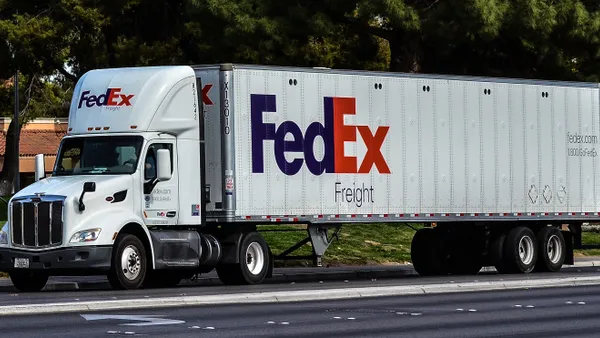Dive Brief:
- C.H. Robinson has released a freight procurement tool, Procure IQ, meant to help large truckload shippers decide whether they should use the annual bidding process or other options on particular lanes, the company announced Tuesday.
- The tool will look at a shipper's freight network and the density of the lanes in which they're moving to determine if contracts, the spot market or other procurement methods is a more appropriate move. It could be cheaper for lower-density lanes to stay on the spot market while higher-density lanes will likely see savings from staying on contract, the company explained in a release.
- "We still think that posting a constraint-based annual bid is still a really important best practice for shippers," C.H. Robinson CEO and President Bob Biesterfeld said in an interview. "But taking a one size fits all approach and pushing all of your freight through that approach is probably not the right approach."
Dive Insight:
Procure IQ was developed as a result of conversations C.H. Robinson had with its largest customers who were looking to get a handle on the market volatility in the spot and contract environment, Biesterfeld said.
"We see a lot of volatility in the domestic shipping markets ... certainly over the course of the last several months, but even over the past few years from the end of 2017 through today," he said. "I mean, the ups and downs that we've seen in the rate cycles have been something we've never seen before."
These market dynamics created volatility for shippers, including non-compliance with routing guides. C.H. Robinson had seen first tender acceptance of routing guides drop from 95% to below 70% even before the pandemic, he said.
"Costs in the spot market quickly declined early in the quarter due to soft demand and then increased sharply as businesses reopened and demand for freight increased," Biesterfeld said, speaking about volatility on a call with analysts in July. "Through all of this disruption, we’ve continued to honor our commitments on our contractual pricing agreements with our truckload customers, despite instances where the cost of purchase transportation exceeds our customer pricing."
In this environment, long-term contracts can be a gamble.
"When you have those unknowns ... taking a static approach to procurement in a 12-month vehicle, you run the risk of accepting what we would call 'paper rates' or 'rates on file' that simply just don't get your products to market in a way that you need them to be," Biesterfeld said.

The Procure IQ tool can suggest a proactive contract with C.H. Robinson or another carrier to create multi-leg, dedicated or continuous moves. And C.H. Robinson said it helps shippers determine how much risk is too much risk from the spot market pricing on a particular lane.
"We really try to segment into what should be practically contracted, what should go through a traditional [request for proposals] process, and what should you consider moving in the spot with dynamic pricing," Biesterfeld said. "And that way, the shipper can then solve for getting the right freight into the RFP where they can drive greater compliance and manage those other outliers in a manner that reduces risk and improves their cost position."
C.H. Robinson announced in 2019 it would invest $1 billion in technology over the next five years. And the company has announced a string of technology initiatives over the last year, including multiple projects focused on its Navisphere platform.
"This was never about spending a billion dollars and delivering one thing," Biesterfeld said.














